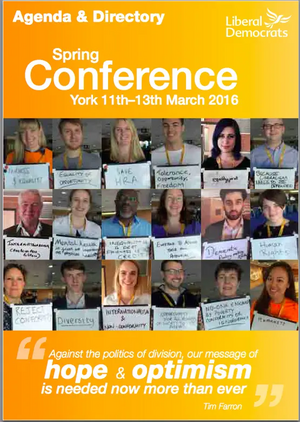Coming up at the Liberal Democrats' Spring Conference

The Liberal Democrats' Spring Conference is being held in York next weekend. This is a shorter conference than the main one in the autumn, but a lot is crammed into the agenda. From the opening Conference Rally on Friday evening (with party leader Tim Farron and EU Referendum campaign leader Catherine Bearder) to Tim Farron's closing speech at lunchtime on Sunday, there is a jam-packed programme.
For many party members, the meat of the programme lies in the policy making. In the Liberal Democrats, members get the chance to speak in debates, and to vote, as long as they are attending the conference in their capacity as a party member and are registered to attend for the full duration of conference. Policy debates at the upcoming Spring Conference are:
- Liberal Democrat economic policy
- fracking
- regulatory framework for cannabis
- privacy and security in a digital age
- a fairer deal for private renters.
There is also space in the agenda for an "emergency motion or topical issue", to be announced the day before, to allow for timely consideration of topics that were perhaps not foreseen at the time when the agenda was drawn up.
Consultative sessions invite members' input to policy/decision-making, in a less formal forum than full-scale debates. Sessions will be held on:
- liberty and security
- social security
- "Agenda 2020 - Your Liberal Britain"
- governance review.
Conference is also an opportunity for members to ask questions. On the main agenda is a Question & Answer session with party leader Tim Farron, for which voting members can submit questions in advance. There are also Q&A sessions with parliamentarians and spokespeople, on the subject of foreign affairs, Defra & DECC, and health.
The conference provides a formal mechanism for reporting back on party activity, and short reports will be heard from the Federal Conference Committee, the Federal Policy Committee, the Federal Executive, the Diversity and Engagement Group, the Campaign for Gender Balance, the Federal Finance and Administration Committee, and the Parliamentary Party.
Motions for governing the internal machinery of the party are also included, such as:
- business motion: appointment of the Federal Appeal Panel 2016-2020
- constitutional amendment: allowing Associated Organisations (AOs) and Specified Associated Organisations (SAOs) to enrol members to the Liberal Democrats
- constitutional amendment: representation of peers on Federal Committees
- business motion: electing diverse MPs (likely to be a very hot topic, despite the innocuous-sounding title, since the motion includes the provision in candidate selection for local parties to be able to vote for all-women shortlists, all-disabled shortlists, or to reserve spaces for candidates from other under-represented groups).
And there are speeches as well, of course. Baroness Brinton will open the conference on the Saturday morning. Baroness Burt and Caroline Pidgeon AM will speak later that day, and the closing item on Sunday's agenda is a speech by Tim Farron.
Filling in the short gaps before, during and after the main agenda items above are fringe events, ranging from wide-ranging formal talks to social events (including the late-night Glee Club singalong), a comprehensive programme of training sessions, and an exhibition with exhibitors representing organisations in, or of interest to, the Liberal Democrats.
